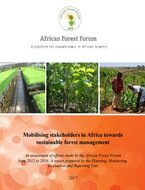This report highlights some findings from evaluation activities that have been undertaken on projects implemented by the African Forest Forum (AFF). Specifically, the evaluations were undertaken with four objectives that demonstrate the contribution of AFF (a) to improved access to up to date information on forestry, (b) to enhanced knowledge and skills among forestry experts to advance sustainable forest management (SFM) in Africa, (c) to changes to institutional plans, policies and structures that are favorable to SFM, and (d) to increased collaboration, networking and partnerships among stakeholders in forestry to promote SFM.
Information from AFF that could be attributed to the first objective, viz. to contribute to improved access to forestry information by stakeholders, was communicated to target audiences through all AFF channels of communication including the website, info mail, meetings and workshops organized by the projects. Most of the respondents (78%) to the surveys reported accessing most information from AFF through the info mail, followed by the website (63%) and AFF publications (53%). The social media pages were the least frequently accessed because they are relatively new communication channels for AFF and members are most probably not very familiar with them; while the info mail was popular because information was conveyed through email, that most people access on a regular basis. About 85% of respondents expressed satisfaction with performance of various aspects of the AFF website, specifically its accessibility, content, coverage, navigation, and interactivity.
Eastern Africa had more respondents accessing AFF information at 33%, compared to West Africa (29%), Central Africa (11%), Southern Africa (17%) and 8% from countries outside Africa.
Academic institutions (comprising universities, university colleges and technical colleges) comprised 45% of respondents who visited the AFF website, followed by research organizations and government institutions at 28% and 17% respectively. Academic institutions and research organizations accessed all the publications more than any other institution, whereas government institutions accessed journal articles, fact sheets, policy briefs and news articles more than civil society organizations, including NGOs. However, the latter access books more than government institutions and both equally accessed technical reports.
In the end, information sourced from AFF has led to improvement in institutional plans, structures, operations and standards for some institutions. Such changes included:
incorporation of aspects from these two trainings in teaching material to guide professional training at universities,
facilitating formulating institutional strategic plans and business plans,
facilitating development national forest certification standards and regulations
development of partnerships and collaborative activities
guidance to development of:
o good forest management/governance practices like code of ethics (in some cases a professional foresters bill was developed for parliament action into law),
o electronic portal between countries to track cross border trade in forest products, and
o good co-management contracts/agreements between local communities and the central government in managing forest resources
Collaborations and partnerships were also formed through the networking facilitated by AFF during the workshops and training sessions. The partnerships included:
Partnerships for joint fundraising on common issues in sustainable forest management
Partnerships with government institutions for development and implementation of policies and regulations
Research partnerships between peer institutions and individuals to promote sustainable forest management
Public-private-partnerships on mutually aggregable forestry issues
Overall, there is a growing acceptance, by target beneficiaries, of AFFs knowledge products and other resources. This could potentially lead to the use of such products by the target audiences, including institutions, to improve their policies and operations. This then could facilitate the sustained management and use of forest and tree resources on the continent in ways that enhance local community livelihoods, national incomes and stability of the environment as envisaged in the mission of AFF.

